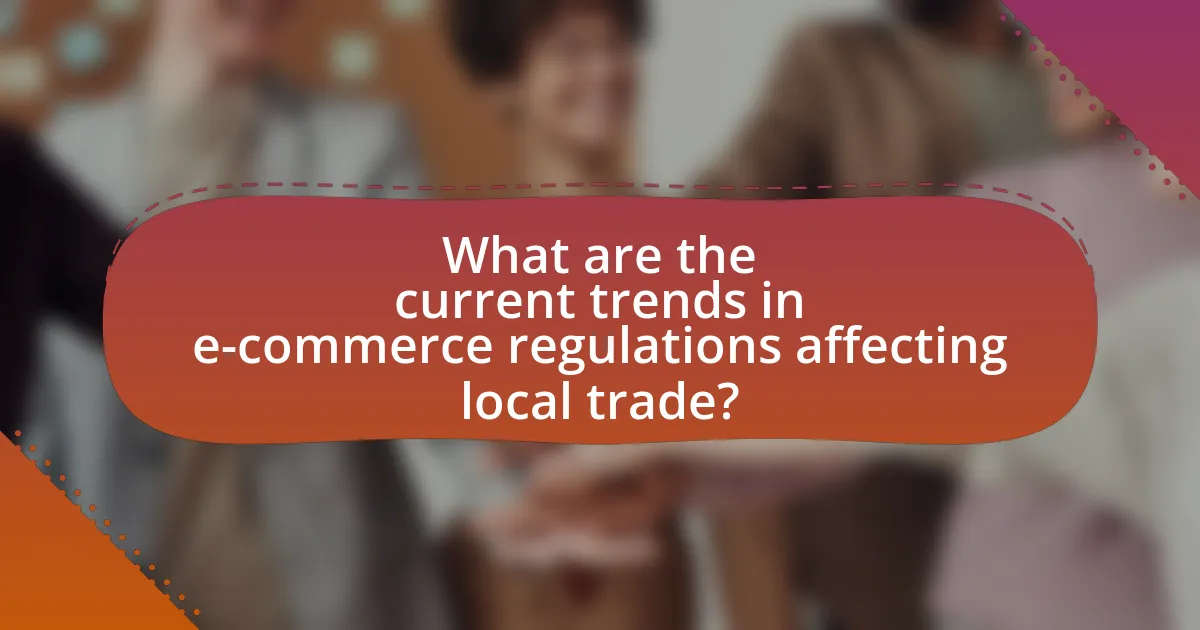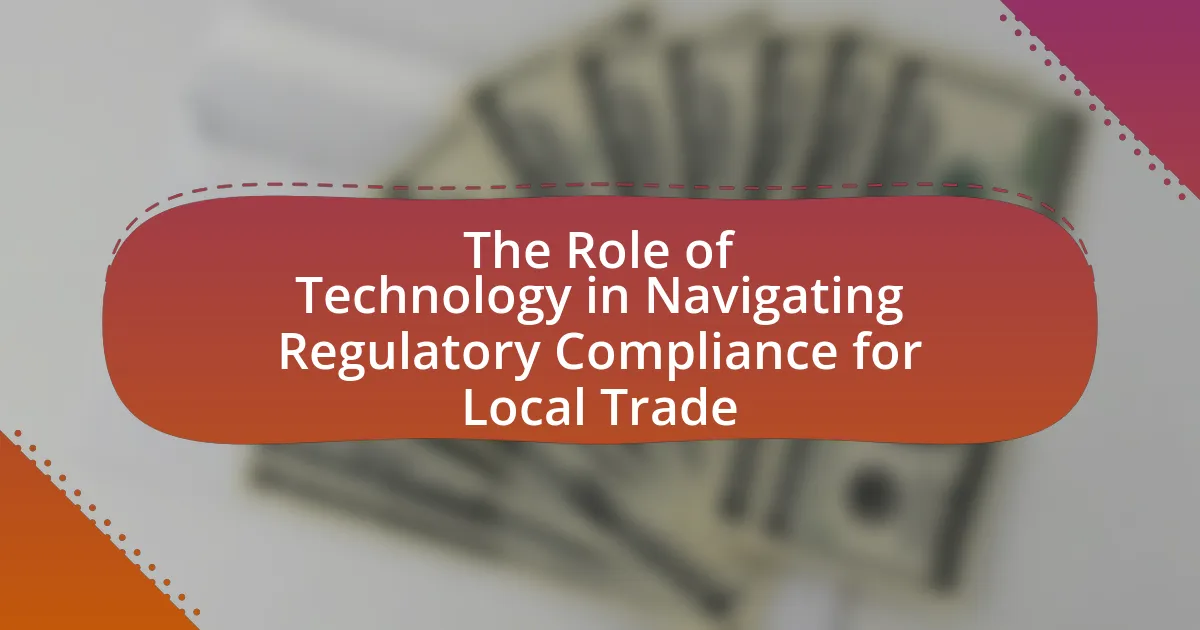The article focuses on the evolving landscape of e-commerce regulations and their impact on local trade. It highlights current trends such as increased data privacy requirements, cross-border taxation, and enhanced consumer protection laws, which are reshaping the regulatory environment for local businesses. The discussion includes the implications of these regulations on consumer behavior, the challenges faced by local businesses in compliance, and the role of technology in shaping these frameworks. Additionally, it explores future developments in consumer protection laws and the significance of international regulations, emphasizing the need for local businesses to adapt and leverage these changes for competitive advantage.

What are the current trends in e-commerce regulations affecting local trade?
Current trends in e-commerce regulations affecting local trade include increased data privacy requirements, cross-border taxation, and enhanced consumer protection laws. For instance, the General Data Protection Regulation (GDPR) in Europe mandates strict data handling practices, influencing local businesses to adopt more robust data protection measures. Additionally, many countries are implementing digital sales taxes to ensure that e-commerce platforms contribute fairly to local economies, as seen in jurisdictions like the United Kingdom and several U.S. states. Furthermore, regulations are evolving to improve transparency in online transactions, requiring clearer return policies and product information to protect consumers, which is evident in recent legislative changes in various regions. These trends reflect a growing emphasis on balancing the benefits of e-commerce with the need for regulatory frameworks that support local trade and consumer rights.
How do these trends impact local businesses?
E-commerce trends significantly impact local businesses by increasing competition and altering consumer behavior. As online shopping becomes more prevalent, local businesses face pressure to enhance their digital presence and adapt to changing customer expectations for convenience and speed. For instance, a report by the U.S. Small Business Administration indicates that 70% of consumers prefer to shop online for its convenience, compelling local retailers to invest in e-commerce platforms to remain competitive. Additionally, local businesses may experience reduced foot traffic as consumers opt for online purchasing, which can lead to decreased sales and potential closures if they do not adapt effectively.
What specific regulations are being introduced or modified?
Specific regulations being introduced or modified in the context of e-commerce include enhanced consumer protection laws, data privacy regulations, and taxation frameworks for online sales. For instance, the European Union’s Digital Services Act aims to increase accountability for online platforms by imposing stricter rules on content moderation and transparency. Additionally, the California Consumer Privacy Act mandates that businesses disclose data collection practices and allows consumers to opt-out of data sales. These regulations are designed to create a safer and more transparent online marketplace, addressing concerns about consumer rights and data security.
How do these changes affect consumer behavior?
Changes in e-commerce regulations significantly affect consumer behavior by increasing trust and transparency in online transactions. When regulations ensure consumer protection, such as data privacy and fair pricing, consumers are more likely to engage in online shopping. For instance, a study by the European Commission found that 70% of consumers feel more secure shopping online when they know their rights are protected. Additionally, stricter regulations can lead to improved product quality and service standards, further encouraging consumers to make purchases. As a result, these regulatory changes foster a more favorable shopping environment, ultimately driving higher consumer confidence and increased spending in e-commerce.
What role does technology play in shaping e-commerce regulations?
Technology plays a crucial role in shaping e-commerce regulations by enabling the development of new frameworks that address digital transactions, consumer protection, and data privacy. As e-commerce platforms evolve, regulatory bodies utilize technology to monitor compliance, enforce laws, and adapt to emerging trends such as blockchain and artificial intelligence. For instance, the implementation of GDPR in Europe was significantly influenced by advancements in data processing technologies, which necessitated stricter regulations on data handling and consumer rights. This illustrates how technological advancements directly inform and modify regulatory approaches to ensure they remain relevant and effective in a rapidly changing digital landscape.
How are advancements in technology influencing regulatory frameworks?
Advancements in technology are significantly influencing regulatory frameworks by necessitating updates to laws that govern digital transactions and data privacy. As e-commerce platforms evolve, regulators are compelled to address issues such as cybersecurity, consumer protection, and cross-border trade. For instance, the rise of artificial intelligence and blockchain technology has prompted the need for regulations that ensure transparency and accountability in transactions. The General Data Protection Regulation (GDPR) in the European Union exemplifies how technology-driven concerns about data privacy have led to comprehensive legal frameworks aimed at protecting consumer information in online environments.
What technologies are most affected by these regulations?
The technologies most affected by e-commerce regulations in local trade include payment processing systems, data privacy technologies, and supply chain management software. Payment processing systems are impacted due to regulations requiring secure transactions and compliance with anti-fraud measures. Data privacy technologies face scrutiny as regulations mandate stricter controls on consumer data usage and protection, particularly in light of laws like GDPR. Supply chain management software is influenced by regulations that enforce transparency and ethical sourcing, necessitating compliance tracking and reporting features. These technologies must adapt to meet evolving regulatory standards, ensuring they align with legal requirements while maintaining operational efficiency.

What challenges do local businesses face with evolving e-commerce regulations?
Local businesses face significant challenges with evolving e-commerce regulations, primarily due to compliance costs and the complexity of navigating diverse legal frameworks. As regulations frequently change, businesses must invest time and resources to understand and implement new requirements, which can strain their operational capabilities. For instance, a 2021 survey by the National Federation of Independent Business indicated that 30% of small businesses reported increased compliance costs as a major barrier to growth. Additionally, local businesses often struggle with the disparity in regulations across different jurisdictions, leading to confusion and potential legal risks. This inconsistency can hinder their ability to compete effectively in the digital marketplace, as they may lack the resources to adapt quickly compared to larger corporations.
How can local businesses adapt to these regulatory changes?
Local businesses can adapt to regulatory changes by implementing compliance strategies and leveraging technology. By staying informed about new regulations, businesses can adjust their operations to meet legal requirements, such as updating privacy policies or modifying payment processes. For instance, the General Data Protection Regulation (GDPR) in Europe necessitated that many businesses enhance their data protection measures, leading to increased consumer trust and compliance. Additionally, utilizing software solutions for tracking regulatory updates can streamline the adaptation process, ensuring that businesses remain compliant and competitive in the evolving e-commerce landscape.
What strategies can be employed to ensure compliance?
To ensure compliance with e-commerce regulations in local trade, businesses can implement a combination of robust training programs, regular audits, and the use of compliance management software. Training programs educate employees on relevant laws and regulations, fostering a culture of compliance. Regular audits help identify gaps in adherence to regulations, allowing for timely corrective actions. Compliance management software streamlines the monitoring of regulatory changes and facilitates reporting, ensuring that businesses remain up-to-date with evolving legal requirements. According to a study by the International Compliance Association, organizations that invest in compliance training and technology report a 30% reduction in compliance violations.
How can businesses leverage regulations to their advantage?
Businesses can leverage regulations to their advantage by ensuring compliance while also identifying opportunities for differentiation and competitive advantage. By adhering to regulations, businesses can build trust with consumers, as compliance often signals reliability and ethical practices. For instance, companies that meet data protection regulations, such as the General Data Protection Regulation (GDPR), can market themselves as secure and trustworthy, attracting privacy-conscious customers. Additionally, businesses can utilize regulatory incentives, such as tax breaks or grants for sustainable practices, to enhance profitability. Research shows that companies that proactively engage with regulations often experience improved brand reputation and customer loyalty, leading to increased market share.
What are the implications of non-compliance for local traders?
Non-compliance for local traders can result in significant financial penalties and legal repercussions. Local traders who fail to adhere to e-commerce regulations may face fines that can reach thousands of dollars, depending on the severity of the violation. For instance, the Federal Trade Commission (FTC) has imposed fines on businesses for misleading advertising practices, which can serve as a precedent for local traders. Additionally, non-compliance can lead to the suspension or revocation of business licenses, severely impacting a trader’s ability to operate. Furthermore, reputational damage can occur, as consumers may lose trust in businesses that do not follow regulations, leading to decreased sales and customer loyalty.
What penalties do businesses face for failing to comply?
Businesses that fail to comply with e-commerce regulations may face significant penalties, including fines, legal action, and loss of operating licenses. For instance, non-compliance with data protection laws can result in fines up to 4% of annual global turnover or €20 million, whichever is higher, as stipulated by the General Data Protection Regulation (GDPR). Additionally, businesses may incur reputational damage, which can lead to decreased customer trust and loss of sales. These penalties serve as a deterrent to ensure adherence to regulations designed to protect consumers and maintain fair market practices.
How can non-compliance affect a business’s reputation?
Non-compliance can severely damage a business’s reputation by eroding customer trust and leading to negative public perception. When a business fails to adhere to regulations, it may face legal penalties, which can be widely reported in the media, further tarnishing its image. For instance, a study by the Ponemon Institute found that 75% of consumers would stop purchasing from a company that has been involved in a compliance violation. Additionally, non-compliance can result in loss of partnerships and increased scrutiny from regulators, compounding the reputational damage.

What future developments can we expect in e-commerce regulations for local trade?
Future developments in e-commerce regulations for local trade will likely focus on enhancing consumer protection, ensuring fair competition, and addressing data privacy concerns. Regulatory bodies are increasingly recognizing the need for frameworks that protect local businesses from unfair practices by larger online platforms, as evidenced by recent legislative efforts in various countries aimed at leveling the playing field. For instance, the European Union’s Digital Markets Act aims to curb anti-competitive behavior by major tech companies, which directly impacts local trade by fostering a more equitable marketplace. Additionally, as consumer awareness of data privacy grows, regulations similar to the General Data Protection Regulation (GDPR) are expected to expand, mandating stricter compliance for e-commerce businesses regarding user data handling. These anticipated changes reflect a broader trend towards more robust regulatory environments that prioritize local economic interests and consumer rights.
How might consumer protection laws evolve in the e-commerce landscape?
Consumer protection laws are likely to evolve in the e-commerce landscape by becoming more stringent and comprehensive to address emerging challenges such as data privacy, fraud, and cross-border transactions. As e-commerce continues to grow, regulatory bodies are increasingly recognizing the need for laws that protect consumers from deceptive practices and ensure transparency in online transactions. For instance, the General Data Protection Regulation (GDPR) in Europe has set a precedent for stricter data privacy laws, influencing similar regulations worldwide. Additionally, as online marketplaces expand, there may be a push for laws that hold platforms accountable for the products sold, ensuring that consumers have recourse in cases of defective or harmful goods. This evolution reflects a broader trend towards enhancing consumer rights and safety in the digital marketplace.
What new consumer rights could emerge from these regulations?
New consumer rights that could emerge from these regulations include enhanced data protection rights, the right to transparent pricing, and the right to fair dispute resolution. Enhanced data protection rights would ensure consumers have greater control over their personal information, aligning with regulations like the General Data Protection Regulation (GDPR) in Europe, which has set a precedent for consumer privacy. The right to transparent pricing would require businesses to disclose all costs associated with a purchase, preventing hidden fees and fostering trust. Additionally, the right to fair dispute resolution would mandate accessible and efficient processes for consumers to resolve issues with e-commerce transactions, similar to the Consumer Financial Protection Bureau’s initiatives in the United States aimed at protecting consumer interests.
How will these changes impact the relationship between consumers and businesses?
The changes in e-commerce regulations will enhance transparency and trust between consumers and businesses. As regulations become stricter, businesses will be required to provide clearer information about their products, pricing, and data usage, which can lead to increased consumer confidence. For instance, a study by the European Commission in 2021 found that 70% of consumers felt more secure when shopping online due to improved regulatory frameworks. This shift fosters a more accountable marketplace, encouraging businesses to prioritize customer satisfaction and ethical practices.
What role will international regulations play in local e-commerce?
International regulations will significantly influence local e-commerce by establishing standards for cross-border trade, consumer protection, and data privacy. These regulations create a framework that local businesses must adhere to when engaging in international transactions, ensuring compliance with global norms. For instance, the General Data Protection Regulation (GDPR) in the European Union sets stringent data privacy standards that affect how local e-commerce platforms handle customer information, even if the business operates outside the EU. This regulatory landscape encourages local businesses to adopt best practices, fostering trust among consumers and promoting fair competition.
How can local businesses navigate international regulatory challenges?
Local businesses can navigate international regulatory challenges by conducting thorough research on the regulations of target markets and seeking legal counsel to ensure compliance. Understanding specific laws, such as data protection regulations like the General Data Protection Regulation (GDPR) in Europe, is crucial for businesses operating internationally. Additionally, leveraging resources from trade organizations and government export assistance programs can provide valuable insights and support. For instance, the U.S. Small Business Administration offers guidance on international trade regulations, helping businesses to align their operations with foreign laws effectively.
What opportunities arise from harmonized regulations across borders?
Harmonized regulations across borders create opportunities for streamlined trade, reduced compliance costs, and increased market access. By aligning standards and regulations, businesses can operate more efficiently in multiple jurisdictions, minimizing the complexities associated with differing legal frameworks. For instance, the World Trade Organization reports that harmonization can lead to a 10-15% reduction in trade costs, facilitating smoother cross-border transactions. This efficiency encourages investment and innovation, as companies can focus resources on growth rather than navigating regulatory discrepancies.
What best practices should local businesses adopt to thrive under new regulations?
Local businesses should adopt proactive compliance strategies to thrive under new regulations. This includes staying informed about regulatory changes, implementing necessary operational adjustments, and engaging in continuous training for staff to ensure adherence to new laws. For instance, businesses can utilize compliance management software to track regulatory updates and automate reporting processes, which enhances efficiency and reduces the risk of non-compliance penalties. Additionally, fostering open communication with regulatory bodies can provide clarity and guidance, helping businesses navigate complex regulations effectively.




